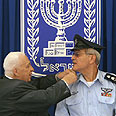
PM Sharon and IDF Chief of Staff
צילום: איי אף פי
Dan Halutz
Halutz is the outgoing IDF chief of staff. He resigned on January 16, in the wake of the failings of last summer's war in Lebanon
Halutz was born in 1948 in Tel Aviv and later moved with his family to Moshav Hagor in the Sharon. In 1966, he enrolled in the IAF’s pilot training course, and in 1968, Halutz completed the course with battle ranking. In 1969, after completing operational training on the Ouragan jet and serving as a pilot on the Mystere and Vautour jets, he joined the pilot squadron of the IAF’s first Phantom jet.
From 1969-1970, Halutz served as a fighter pilot during the War of Attrition and was demobilized in 1973. Following the outbreak of the Yom Kippur War, Halutz returned to the military and shot down three enemy aircraft over the course of the war. In 1978, he was once again demobilized and went on to earn a Bachelor’s degree in economics from the University of Tel Aviv.
With the outbreak of the Lebanon War in 1982, Halutz rejoined the IAF for a third time and retrained to pilot the F-16. In 1984, he received command of the Phantom squadron.
In 1986, Halutz was appointed head of the operational unit of the Lavi jet project, and in 1991, he became commander of the IAF base in Hatzor. In 1993, he was promoted to Brigadier-General and appointed as head of an air group. In 1995, he became head of IAF headquarters. In 1998, Halutz was promoted to Major-General and served as adjunct head of the headquarters branch of the General Staff. The following year, in the aftermath of the reorganization of the General Staff, Halutz became the first commander of the operations branch.
In 2000, Halutz was appointed as IAF commander. Several of his public statements as commander were deemed controversial. For instance, after an aerial attack on Gaza in which a few Palestinian civilians were also killed, Halutz was asked about his feelings while on similar missions. He responded, “I feel a light bump to the aircraft due to the bomb’s release, and a second later, it’s over.” As a result of this statement, a petition was filed with the Supreme Court of Justice against Halutz’s appointment as Deputy Chief of Staff in July 2004, but the petition was rejected.
At the beginning of 2005, Halutz was nominated to replace Chief of Staff Moshe Yaalon, and in June 2005, Halutz took over the position. The high spot of his command was the disengagement from the Gaza Strip, in which he succeeded in removing Jewish settlers from their homes without blood being spilled.
Last summer's war in Lebanon, in which Israel failed to stop Hizbullah firing Katyusha missiles at Israeli cities, was regarded as a failure by most Israelis and Halutz himself admitted that it had harmed Israel's deterrence. In his letter of resignation, he said he was accepting responsibility for the shortcomings in the army the war had unveiled. Halutz's successor is Gabi Ashkenazi.










